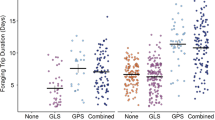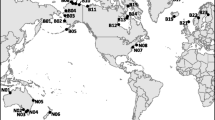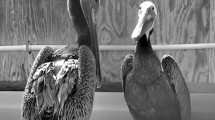Abstract
Tracking devices are increasingly used to monitor individual movement patterns continuously and in high resolution. However, carrying a device could potentially compromise an individual’s physiology or behaviour, thereby making tracking data unreliable for detailed behavioural measurements. To this end, we assessed the possible consequences of the application of GPS devices on offspring development in an opportunistic seabird species, the lesser black-backed gull (Larus fuscus), by comparing the growth and survival of nestlings of which none, one or both parents were equipped with a GPS device. We found that the developmental trajectories of the nestlings were not affected, and there were no differences in skeletal size and body mass at the fledging stage. A lack of negative effects on offspring development strongly suggests that the parental behaviour, and thus likely the foraging behaviour, did not differ between tagged and non-tagged individuals. The evidence that GPS data can be used to reliably study parental care, as well as other aspects of the bird’s behaviour, opens up new possibilities to study behavioural and evolutionary ecological questions in ever-increasing resolution.



Similar content being viewed by others
References
Ackerman JT, Adams J, Takekawa JY, Carter HR, Whitworth DL, Newman SH, Golighty RT, Orthmeyer DL (2004) Effects of radiotransmitters on the reproductive performance of Cassin’s auklets. Wildl Soc Bull 32:1229–1241. https://doi.org/10.2193/0091-7648(2004)032[1229:eorotr]2.0.co;2
Agnew P, Lalas C, Wright J, Dawson S (2013) Effects of attached data-logging devices on little penguins (Eudyptula minor). Mar Biol 160:2375–2382. https://doi.org/10.1007/s00227-013-2231-7
Bannasch R, Wilson RP, Culik B (1994) Hydrodynamic aspects of design and attachment of a back-mounted device in penguins. J Exp Biol 194:83–96
Barron DG, Brawn JD, Weatherhead PJ (2010) Meta-analysis of transmitter effects on avian behaviour and ecology. Methods Ecol Evol 1:180–187. https://doi.org/10.1111/j.2041-210x.2010.00013.x
Bates D, Mächler M, Bolker B, Walker S (2015) Fitting linear mixed-effects models using lme4. J Stat Softw 67:1–48. https://doi.org/10.18637/jss.v067.i01
Beaulieu M, Raclot T, Dervaux A, Le Maho Y, Ropert-Coudert Y, Ancel A (2009) Can a handicapped parent rely on its partner? An experimental study within Adélie penguin pairs. Anim Behav 78:313–320. https://doi.org/10.1016/j.anbehav.2009.05.006
Berthold P, Bossche WVD, Jakubiec Z, Kaatz C, Kaatz M, Querner U (2002) Long-term satellite tracking sheds light upon variable migration strategies of White Storks (Ciconia ciconia). J Ornithol 143:489–495. https://doi.org/10.1046/j.1439-0361.2002.02044.x
Bodey TW, Cleasby IR, Bell F, Parr N, Schultz A, Votier SC, Bearhop S (2017) A phylogenetically controlled meta-analysis of biologging device effects on birds: deleterious effects and a call for more standardized reporting of study data. Methods Ecol Evol 2017:1–10. https://doi.org/10.1111/2041-210X.12934
Bouten W, Baaij EW, Shamoun-Baranes J, Camphuysen KCJ (2013) A flexible GPS tracking system for studying bird behaviour at multiple scales. J Ornithol 154:571–580. https://doi.org/10.1007/s10336-012-0908-1
Camphuysen KCJ (2011) Lesser black-backed gulls nesting at texel: foraging distribution, diet, survival, recruitment and breeding biology of birds carrying advanced GPS loggers. NIOZ Rep. https://doi.org/10.13140/RG.2.1.3574.5364
Camphuysen KCJ, Shamoun-Baranes J, van Loon EE, Bouten W (2015) Sexually distinct foraging strategies in an omnivorous seabird. Mar Biol. https://doi.org/10.1007/s00227-015-2678-9
Ceia FR, Paiva VH, Fidalgo V, Morais L, Baeta A, Crisóstomo P, Mourato E, Garthe S, Marques JC, Ramos JA (2014) Annual and seasonal consistency in the feeding ecology of an opportunistic species, the yellow-legged gull Larus michahellis. Mar Ecol Prog Ser 497:273–284. https://doi.org/10.3354/meps10586
Corman AM, Garthe S (2014) What flight heights tell us about foraging and potential conflicts with wind farms: a case study in lesser black-backed gulls (Larus fuscus). J Ornithol 155:1037–1043. https://doi.org/10.1007/s10336-014-1094-0
Costa DP, Breed GA, Robinson PW (2012) New insights into pelagic migrations: implications for ecology and conservation. Annu Rev Ecol Evol Syst 43:73–96. https://doi.org/10.1146/annurev-ecolsys-102710-145045
Croxall JP, Silk JRD, Phillips RA, Afanasyev V, Briggs DR (2005) Global circumnavigations: tracking year-round ranges of nonbreeding albatrosses. Science 80(307):249–250. https://doi.org/10.1126/science.1106042
Daunt F, Afanasyev V, Silk JRD, Wanless S (2006) Extrinsic and intrinsic determinants of winter foraging and breeding phenology in a temperate seabird. Behav Ecol Sociobiol 59:381–388. https://doi.org/10.1007/s00265-005-0061-4
Davis AK, Diggs NE, Cooper RJ, Marra PP (2008) Hematological stress indices reveal no effect of radio-transmitters on wintering hermit thrushes. J Ornithol 79:293–297. https://doi.org/10.1111/j.1557-9263.2008.00176.x
Development Core Team R (2016) R: a language and environment for statistical computing. Austria, Vienna
Dixon A, Ragyov D, Purev-Ochir G, Rahman ML, Batbayar N, Bruford MW, Zhan X (2016) Evidence for deleterious effects of harness-mounted satellite transmitters on saker falcons Falco cherrug. Bird Study 63:96–106. https://doi.org/10.1080/00063657.2015.1135104
Drent R, Daan S (1980) The prudent parent: energetic adjustments in avian breeding. Ardea 68:225–252
Godfrey JD, Bryant DM, Williams MJ (2003) Radio-telemetry increases free-living energy costs in the endangered Takahe Porphyrio mantelli. Biol Conserv 114:35–38. https://doi.org/10.1016/S0006-3207(02)00416-0
Griffiths R (1992) Sex-biased mortality in the lesser black-backed gull Larus fuscus during the nestling stage. Ibis 134:237–244. https://doi.org/10.1111/j.1474-919X.1992.tb03805.x
Hamer KC, Phillips RA, Wanless S, Harris MP, Wood AG (2000) Foraging ranges, diets and feeding locations of gannets Morus bassanus in the North Sea: Evidence from satellite telemetry. Mar Ecol Prog Ser 200:257–264. https://doi.org/10.3354/meps200257
Harrison F, Barta Z, Cuthill I, Székely T (2009) How is sexual conflict over parental care resolved? A meta-analysis. J Evol Biol 22:1800–1812. https://doi.org/10.1111/j.1420-9101.2009.01792.x
Hernández F, Arredondo JA, Hernandez F, Hewitt DG, DeMaso SJ, Bingham RL (2004) Effects of radiotransmitters on body mass, feed consumption, and energy expenditure of northern bobwhites. Wildl Soc Bull 32:394–400. https://doi.org/10.2193/0091-7648(2004)32[394:EOROBM]2.0.CO;2
Irvine RJ, Leckie F, Redpath SM (2007) Cost of carrying radio transmitters: a test with racing pigeons Columba livia. Wildl Biol 13:238–243. https://doi.org/10.2981/0909-6396(2007)13
Isaksson N, Evans TJ, Shamoun-Baranes J, Åkesson S (2016) Land or sea? Foraging area choice during breeding by an omnivorous gull. Mov Ecol 4:1–14. https://doi.org/10.1186/s40462-016-0078-5
Jordi O, Arizaga J (2016) Sex differences in growth rates of yellow-legged gull Larus michahellis chicks. Bird Study 63:273–278. https://doi.org/10.1080/00063657.2016.1182966
Kaiser SA, Sillett TS, Risk BB, Webster MS (2015) Experimental food supplementation reveals habitat-specific reproductive investment in a migratory bird. Proc R Soc Lond Ser B Biol Sci 282:20142523. https://doi.org/10.1098/rspb.2014.2523
Kidawa D, Jakubas D, Wojczulanis-Jakubas K, Iliszko L, Stempniewicz L (2012) The effects of loggers on the foraging effort and chick-rearing ability of parent little auks. Polar Biol 35:909–917. https://doi.org/10.1007/s00300-011-1136-5
Klaassen R, Reneerkens J (2014) Bird tracking. Limosa 87:58–73
Lamb JS, Satgé YG, Fiorello CV, Jodice PGR (2016) Behavioral and reproductive effects of bird-borne data logger attachment on brown pelicans (Pelecanus occidentalis) on three temporal scales. J Ornithol. https://doi.org/10.1007/s10336-016-1418-3
Newell M, Wanless S, Harris MP, Daunt F (2015) Effects of an extreme weather event on seabird breeding success at a North Sea colony. Mar Ecol Prog Ser 532:257–268. https://doi.org/10.3354/meps11329
Orchan Y, Ovaskainen O, Bouten W, Nathan R (2016) Novel insights into the map stage of true navigation in nonmigratory wild birds (stone curlews, Burhinus oedicnemus). Am Nat 187:E000. https://doi.org/10.1086/686054
Paredes R, Jones IL, Boness DJ (2005) Reduced parental care, compensatory behaviour and reproductive costs of thick-billed murres equipped with data loggers. Anim Behav 69:197–208. https://doi.org/10.1016/j.anbehav.2003.12.029
Patrick SC, Weimerskirch H (2014) Personality, foraging and fitness consequences in a long lived seabird. PLoS One 9:e87269. https://doi.org/10.1371/journal.pone.0087269
Patrick SC, Bearhop S, Bodey TW, Grecian WJ, Hamer KC, Lee J, Votier SC (2015) Individual seabirds show consistent foraging strategies in response to predictable fisheries discards. J Avian Biol 46:431–440. https://doi.org/10.1111/jav.00660
Phillips RA, Xavier JC, Croxall JP (2003) Effects of satellite transmitters on albatrosses and petrels. Auk 120:1082–1090. https://doi.org/10.1642/0004-8038(2003)120[1082:EOSTOA]2.0.CO;2
Pinheiro J, Bates D, DebRoy S, Sarkar D, R Core Team (2018) nlme: Linear and nonlinear mixed effects models. R package version 3.1-137. https://CRAN.R-project.org/package=nlme. Accessed 12 Mar 2018
Robinson JL, Jones IL (2014) An experimental study measuring the effects of a tarsus-mounted tracking device on the behaviour of a small pursuit-diving seabird. Behaviour 151:1799–1826. https://doi.org/10.1163/1568539X-00003217
Rock P, Camphuysen KCJ, Shamoun-Baranes J, Ross-Smith VH, Vaughan IP (2016) Results from the first GPS tracking of roof-nesting herring gulls Larus argentatus in the UK. Ringing Migr 31:47–62. https://doi.org/10.1080/03078698.2016.1197698
Ropert-Coudert Y, Knott N, Chiaradia A, Kato A (2007) How do different data logger sizes and attachment positions affect the diving behaviour of little penguins? Deep Res Part II Top Stud Oceanogr 54:415–423. https://doi.org/10.1016/j.dsr2.2006.11.018
Sergio F, Tavecchia G, Tanferna A, López Jiménez L, Blas J, De Stephanis R, Marchant TA, Kumar N, Hiraldo F (2015) No effect of satellite tagging on survival, recruitment, longevity, productivity and social dominance of a raptor, and the provisioning and condition of its offspring. J Appl Ecol 52:1665–1675. https://doi.org/10.1111/1365-2664.12520
Shaffer SA, Costa DP, Weimerskirch H (2003) Foraging effort in relation to the constraints of reproduction in free-ranging albatrosses. Funct Ecol 17:66–74. https://doi.org/10.1046/j.1365-2435.2003.00705.x
Shaffer SA, Cockerham S, Warzybok P, Bradley RW, Jahncke J, Clatterbuck CA, Lucia M, Jelincic JA, Cassell AL, Kelsey EC, Adams J (2017) Population-level plasticity in foraging behavior of western gulls (Larus occidentalis). Mov Ecol 5:27. https://doi.org/10.1186/s40462-017-0118-9
Shamoun-Baranes J, Bom R, van Loon EE, Ens BJ, Oosterbeek K, Bouten W (2012) From sensor data to animal behaviour: an oystercatcher example. PLoS One 7:28–30. https://doi.org/10.1371/journal.pone.0037997
Sicurella B, Caffi M, Caprioli M, Rubolini D, Saino N, Ambrosini R (2015) Weather conditions, brood size and hatching order affect common swift Apus apus nestlings survival and growth. Bird Study 62:64–77. https://doi.org/10.1080/00063657.2014.989193
Sofaer HR, Chapman PL, Sillett TS, Ghalambor CK (2013) Advantages of nonlinear mixed models for fitting avian growth curves. J Avian Biol 44:469–478. https://doi.org/10.1111/j.1600-048X.2013.05719.x
Sokolov LV (2011) Modern telemetry: New possibilities in ornithology. Biol Bull 38:885–904. https://doi.org/10.1134/S1062359011090081
Steigerwald EC, Igual JM, Payo-Payo A, Tavecchia G (2015) Effects of decreased anthropogenic food availability on an opportunistic gull: evidence for a size-mediated response in breeding females. Ibis (Lond 1859) 157:439–448. https://doi.org/10.1111/ibi.12252
Stienen EWM, Desmet P, Aelterman B, Courtens W, Feys S, Vanermen N, Verstraete H, Van de Walle M, Deneudt K, Hernandez F, Houthoofdt R, Vanhoorne B, Bouten W, Buijs R-J, Kavelaars MM, Müller W, Herman D, Matheve H, Sotillo A, Lens L (2016) GPS tracking data of lesser black-backed gulls and herring gulls breeding at the southern North Sea coast. Zookeys 555:115–124. https://doi.org/10.3897/zookeys.555.6173
Thaxter CB, Ross-Smith VH, Clark JA, Clark NA, Conway GJ, Marsh M, Leat EHK, Burton NHK (2014) A trial of three harness attachment methods and their suitability for long-term use on lesser black-backed gulls and Great skuas. Ringing Migr 29:65–76. https://doi.org/10.1080/03078698.2014.995546
Thaxter CB, Ross-Smith VH, Bouten W, Clark NA, Conway GJ, Rehfisch MM, Burton NHK (2015) Seabird–wind farm interactions during the breeding season vary within and between years: A case study of lesser black-backed gull Larus fuscus in the UK. Biol Conserv 186:347–358. https://doi.org/10.1016/j.biocon.2015.03.027
Thaxter CB, Ross-Smith VH, Clark JA, Clark NA, Conway GJ, Masden EA, Wade HM, Leat EHK, Gear SC, Marsh M, Booth C, Furness RW, Votier SC, Burton NHK (2016) Contrasting effects of GPS device and harness attachment on adult survival of lesser black-backed gulls Larus fuscus and Great skuas Stercorarius skua. Ibis 158:279–290. https://doi.org/10.1111/ibi.12340
Vandenabeele SP, Wilson R, Grogan A (2011) Tags on seabirds; how seriously are we considering instrument-induced behaviors? Anim Welf 20:559–571
Vardanis Y, Klaassen RHG, Strandberg R, Alerstam T (2011) Individuality in bird migration: routes and timing. Biol Lett 7:502–505. https://doi.org/10.1098/rsbl.2010.1180
Whidden SE, Williams CT, Breton AR, Buck CL (2007) Effects of transmitters on the reproductive success of tufted puffins. J Ornithol 78:206–212. https://doi.org/10.1111/j.1557-9263.2007.00103.x
Williams GC (1966) Natural selection, the costs of reproduction, and a refinement of Lack’s principle. Am Nat 100:687–690
Acknowledgements
We are grateful to LifeWatch and NaturaPeople for funding of GPS devices and infrastructure; Fransisco Hernandes and Robin Houthoofdt (VLIZ) for logistical support; Peter Desmet (INBO), Bart Aelterman (INBO), Fransisco Hernandez (VLIZ) and Willem Bouten (UvABiTS) for data support; ANB, Hilbran Verstraete, Nicolas Vanermen, Marc Van de Walle, Wouter Courtens, Aurélie Dailledouze and Jorn Suijkerbuijk for their support in the field. We thank the authorities of Zeebrugge Port (MBZ) and Zeeland Seaports for their permission to access the ports, and PSA, APM, COVRA, EPZ, Pacorini and Van Citters Beheer BV for access to their sites. We are also grateful to the reviewers for their constructive comments on a previous version of the manuscript. This study was funded by the Research Foundation Flanders (FWO ID: 11ZI716N and G0E1614N).
Author information
Authors and Affiliations
Corresponding author
Ethics declarations
Conflict of interest
The authors declare that they have no conflict of interest.
Research involving animals
All procedures performed in this study have been approved by the University of Antwerp ethical committee (file number 2013-73) and the University of Groningen ethical committee (file number 6986/6986A).
Additional information
Responsible Editor: V. Paiva.
Reviewed by J. M. Pereira, V. Ross-Smith and an undisclosed expert.
Rights and permissions
About this article
Cite this article
Kavelaars, M.M., Stienen, E., Matheve, H. et al. GPS tracking during parental care does not affect early offspring development in lesser black-backed gulls. Mar Biol 165, 87 (2018). https://doi.org/10.1007/s00227-018-3347-6
Received:
Accepted:
Published:
DOI: https://doi.org/10.1007/s00227-018-3347-6




